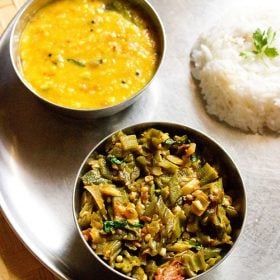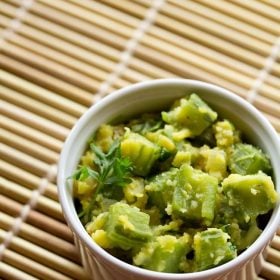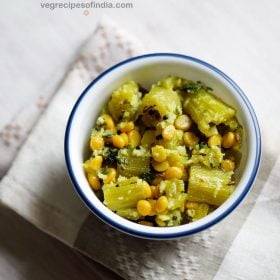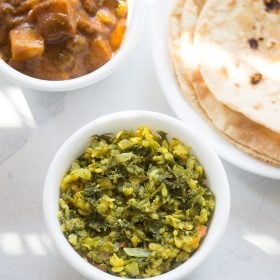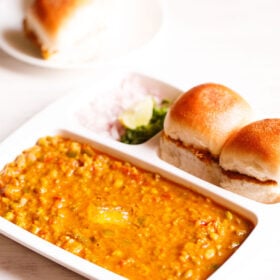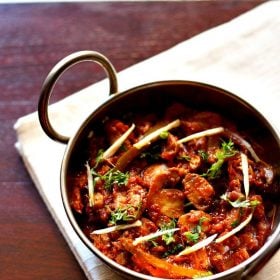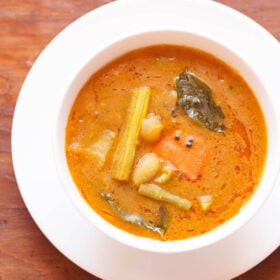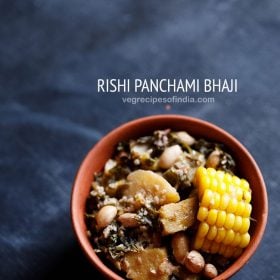Here’s a traditional dish from Maharashtrian cuisine, Rushichi Bhaji, which is festive in nature first, and then everything else. This is because it is one of those must dishes that are prepared during Rishi Panchami that is celebrated on the second day of the Ganesh Chaturthi festival. For this reason, it is also commonly referred to as Rishi Panchami Bhaji. It is one of those veggie preparations that is my favorite too as it is not just delicious, but super healthy, vegan and gluten-free too. This year Rishi Panchami is celebrated on 20 September 2023.
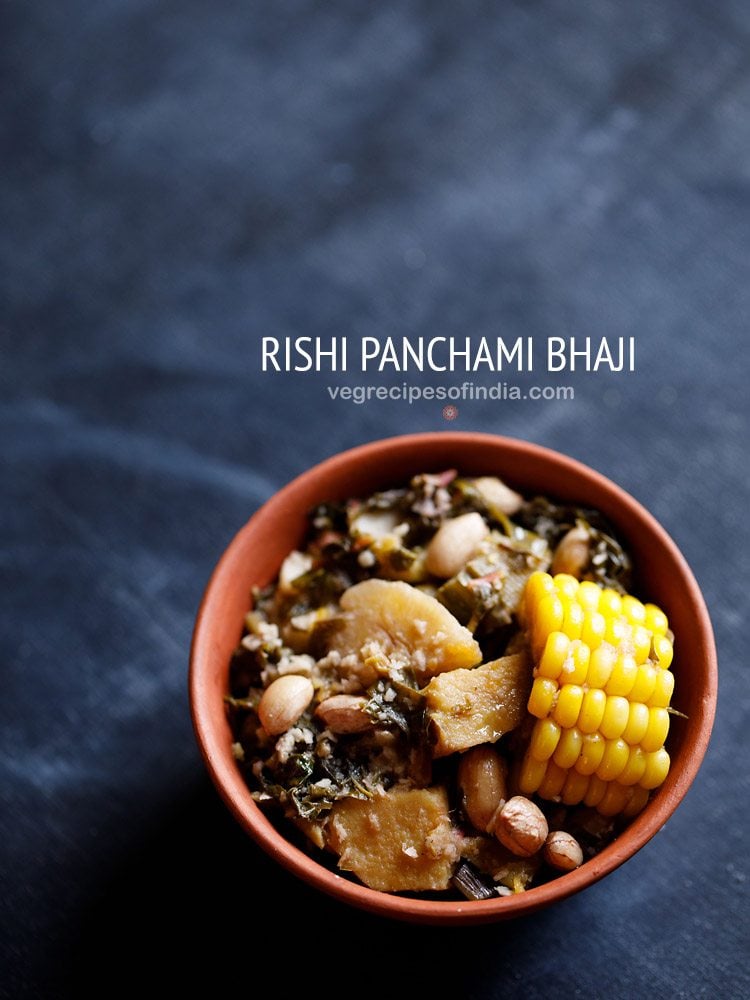
Table of Contents
About Rushichi Bhaji
As I mentioned in the beginning, the second day of the festival of Ganesh Chaturthi is celebrated as Rishi Panchami in Maharashtra, and Malvan and Konkan regions.
On this day, each of the ‘sapta rishi (seven sages)’ are worshipped and remembered. They are Kashyapa, Vishwamitra, Jamadagni, Atri, Gautam, Bharadwaj and Vashishta. Sage Vashishta’s wife Arundhati is worshipped too.
Rushichi Bhaji is a special delicacy that is cooked on this day. Also referred to as Rishi Panchami Bhaji, named after the sacred day, this dish comprises a mix of seasonal vegetables and tubers.
A unique thing about this sabzi is that it includes all those veggies, leafy greens, and tubers that are farmed without the use of an oxen.
Rishi Panchami Bhaji is also made in a way that can be compared to the way cooking was done during the time of the rishis or sages.
That is simple and wholesome food, great for the body, mind, and soul. I have mentioned the vegetables that go in the recipe of this bhaji, in detail in the below sections. Do give it a read.
The most authentic Rushichi Bhaji is cooked in earthen pots, where each vegetable is cooked separately as the cooking time differs. Cooking each veggie separately takes a lot of time. Moreover, preparing the vegetables is also time-consuming.
Hence, I always cook everything together and at times even use a pressure cooker. However, in this Rishi Panchami Bhaji Recipe, I have demonstrated the veggies being cooked in a large pot.
More time is required in the preparation of the bhaji, rather than the actual cooking. The cooking part is easy and does not take much time. Since Rushichi Bhaji is prepared once a year, it is fine if some time is taken to do the prep work.
In addition to this Rishi Panchami Bhaji, another seasonal and festive recipe popular in Maharashtra one day before Makar Sankranti is this Bhogichi Bhaji. This one is also a tasty preparation with fresh seasonal produce.
This yummy bhaji can be served with rice flour bhakris or rice pooris. You can also serve it with chapatis, phulkas, or steamed rice.
Rishi Panchami Bhaji: A Veggie Heaven
It is only right to talk about the plethora of super nutritious and great for health range of vegetables, tubers, and leafy greens that go in this Rushichi Bhaji, separately.
The list is quite extensive. But it is because of this seasonal bounty by Mother Nature, that this classic bhaji is a fantastic creation. It’s like, being really blessed by the Supreme powers!
For making Rishi Panchami Bhaji, you can use the following:
- Amaranth leaves – chawli, chaulai (red or green)
- Colocasia roots – arbi, alu
- Colocasia leaves – arbi ke patte, alu che paan
- Sweet potato – shakarkandi
- Snake gourd – parwal, chichinda
- Ridge gourd – turai, dodka
- Elephant foot yam – suran
- Pumpkin – kaddu, bhopla
- Raw banana/plantain – kachche kele
- Potatoes – aloo, batata
- Tender peanuts – moongphali
- Corn – makai, makka
I have added colocasia and yam in the bhaji. So, I have also used a souring agent, tamarind pulp. Some fresh curd can be added instead of tamarind.
You can skip tamarind, if not using such veggies that may cause irritation and itchiness in the throat to some people. Then, jaggery can be skipped too.
How to make Rushichi Bhaji
Preparation
1. In a small bowl, take 1 teaspoon tamarind and ¼ cup hot water. Soak tamarind in hot water for 20 minutes.
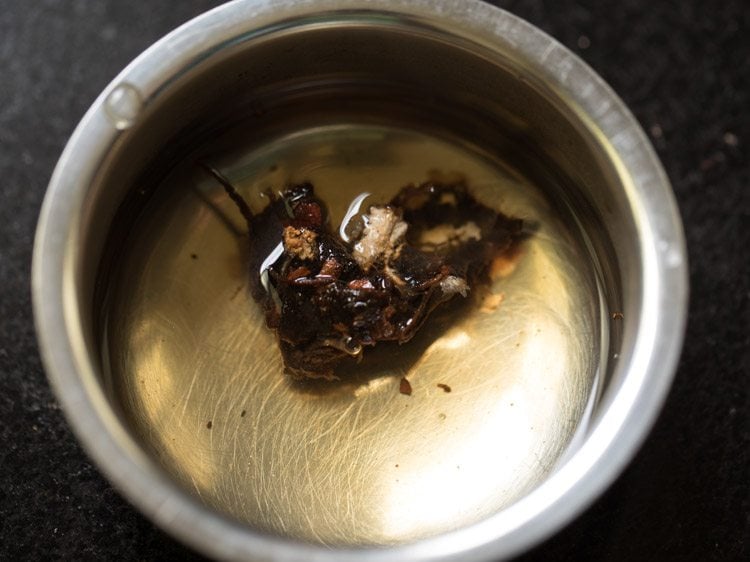
2. Later, squeeze the pulp from the tamarind and keep aside.
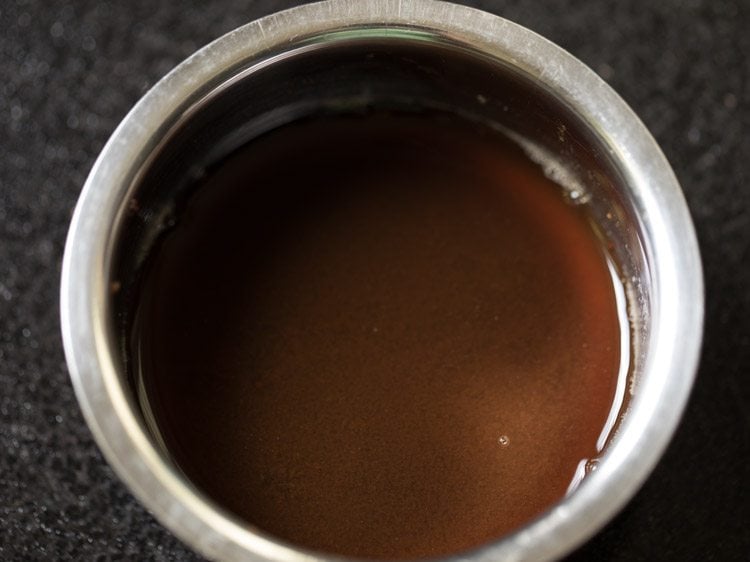
3. Rinse the leafy vegetables very well and keep aside. For the greens, I have used colocasia leaves (arbi patta) and red amaranth leaves (chaulai).
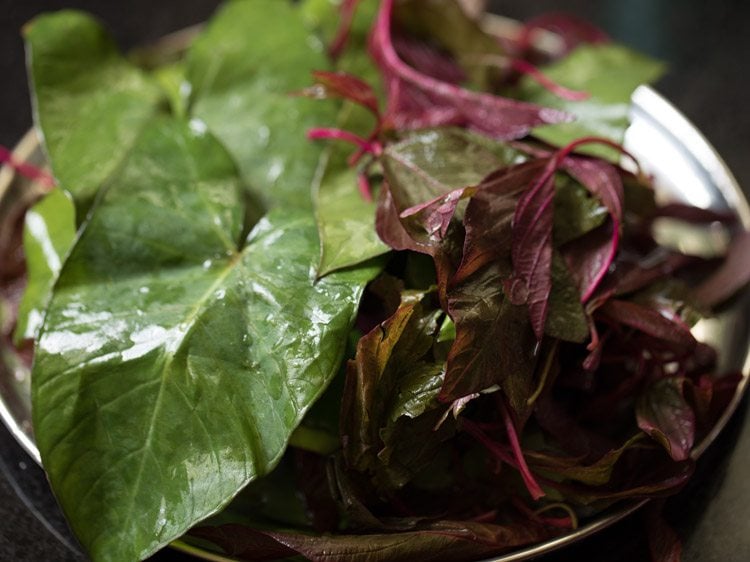
4. Also, rinse and peel other vegetables. I have here used ridge gourd, yellow pumpkin, elephant foot yam, raw banana and corn.
I have used 700 grams of mixed vegetables, including the greens.
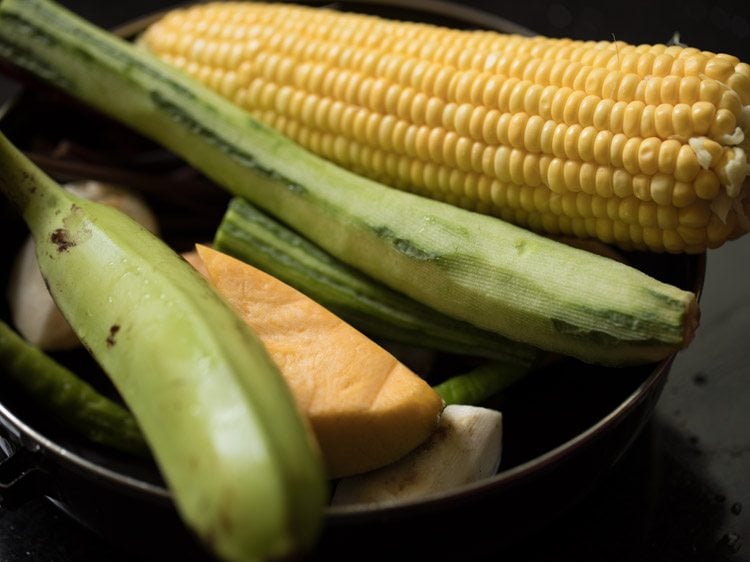
5. Shell fresh peanuts and rinse them too. You will need ½ cup fresh peanuts.
If not using fresh peanuts, soak ½ cup raw peanuts overnight in water. Drain the water and keep aside.
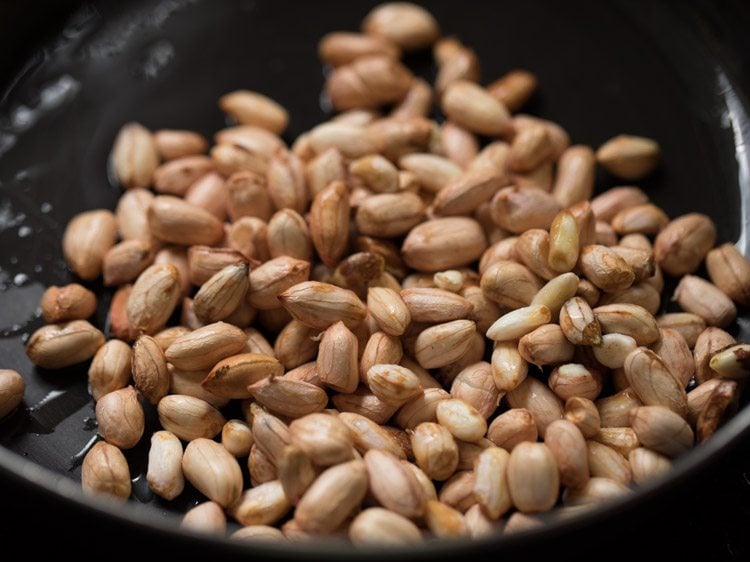
6. Chop each vegetable in squares or cubes. You can keep medium-sized cubes. I have also chopped the stems of amaranth and colocasia leaves.
You can chop the corn cob in roundels or you can even scrape the corn kernels from the cob.
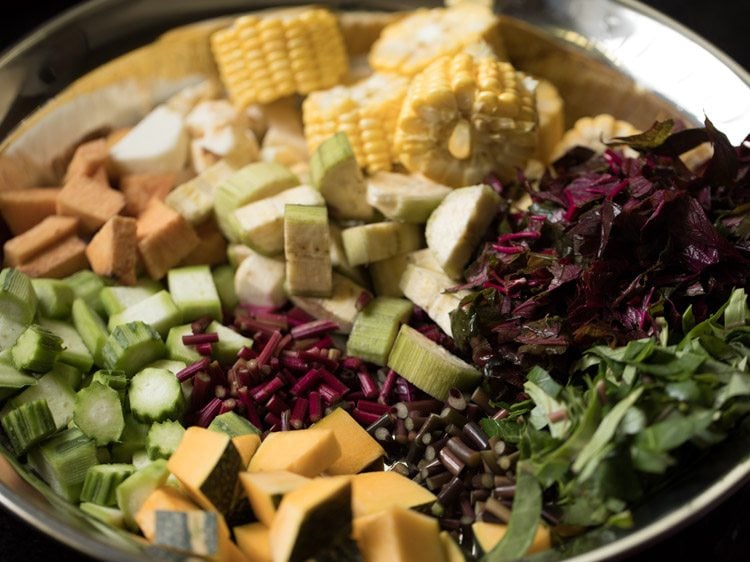
Make Rushichi Bhaji
7. Heat 3 tablespoons peanut oil in a large pot or pan. Add 2 chopped green chilies. You can also use ghee, instead of oil.
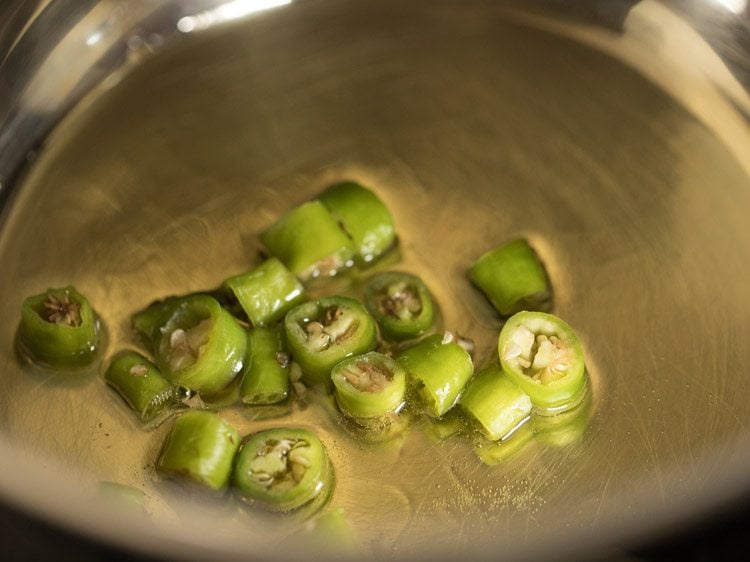
8. Sauté green chilies for some seconds.
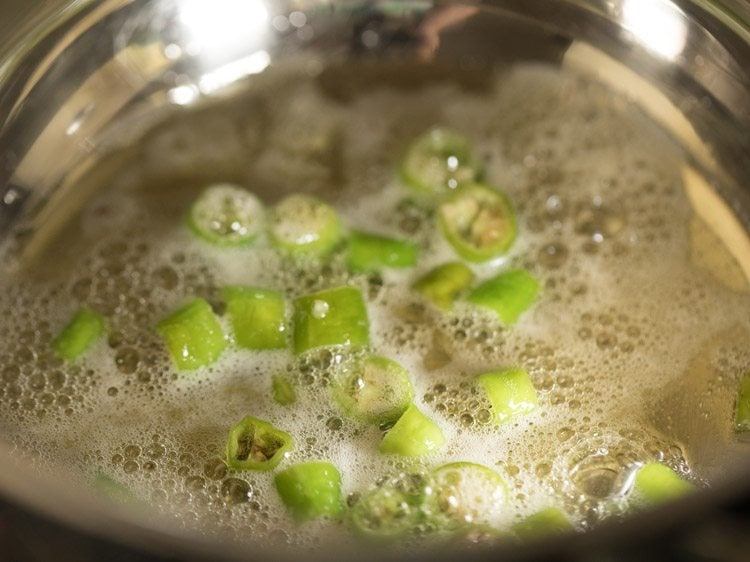
9. Then, add the chopped amaranth and colocasia leaves along with the stems.
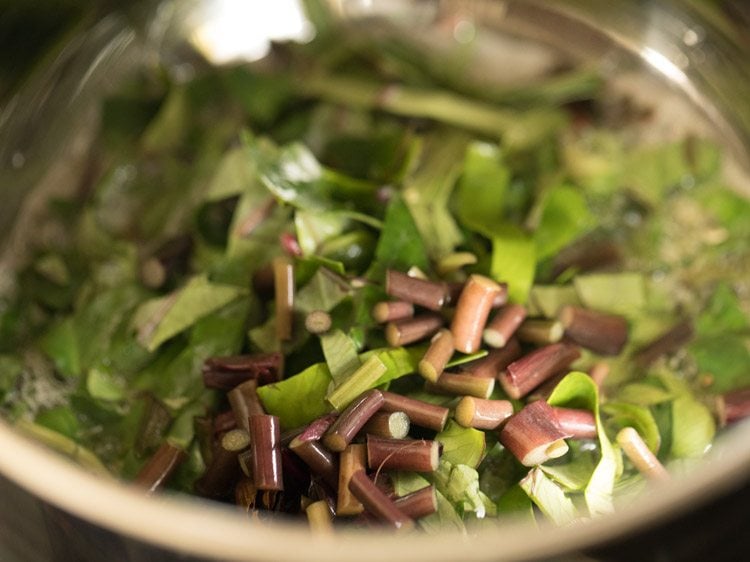
10. Sauté for a minute.
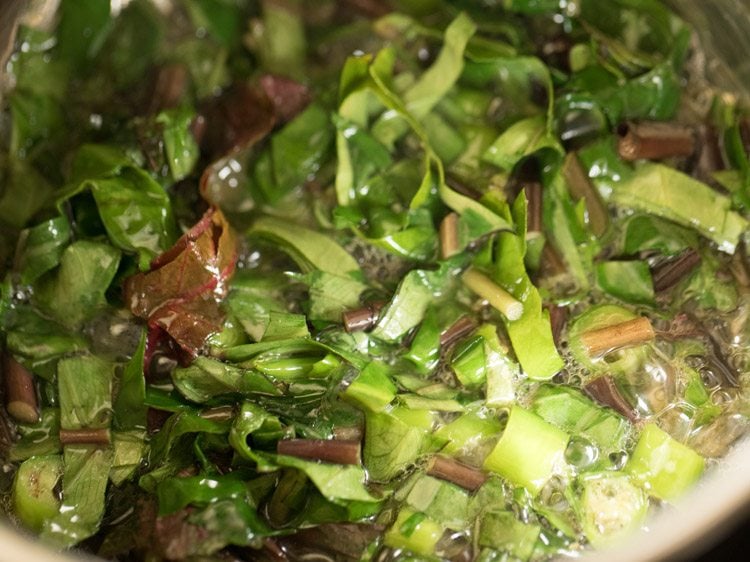
11. Then, add the remaining chopped vegetables.
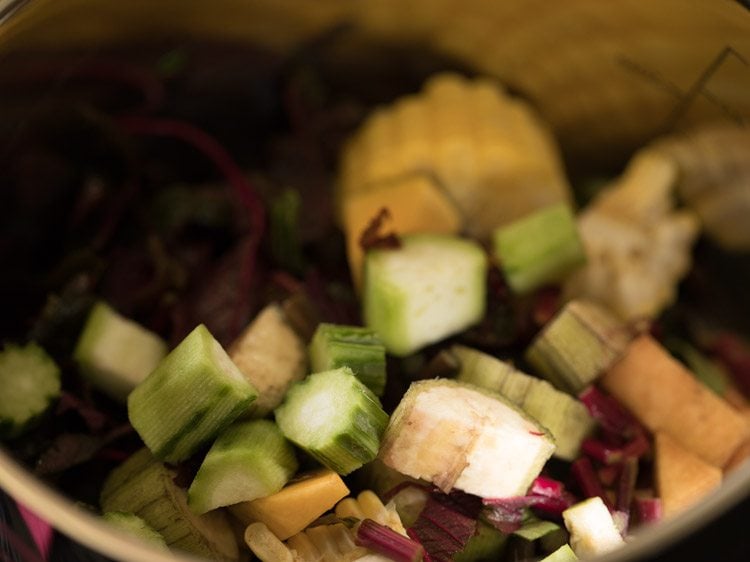
12. Mix very well and sauté for 1 to 2 minutes.
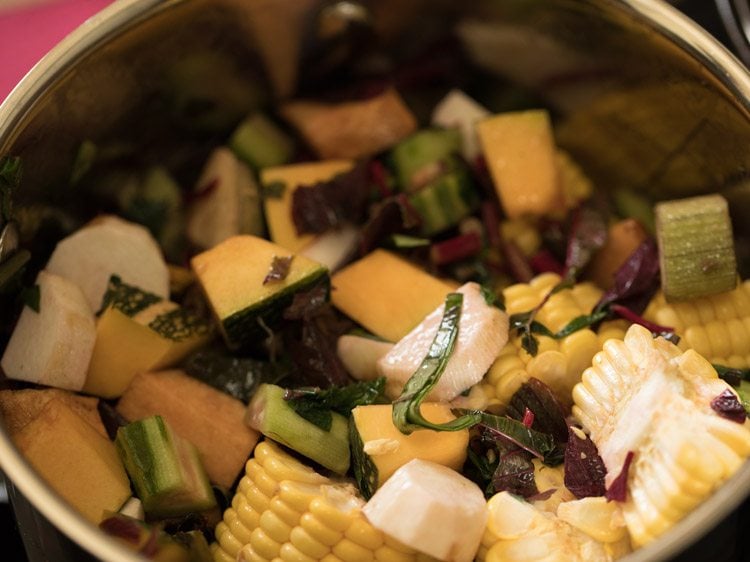
13. Add ½ cup peanuts.
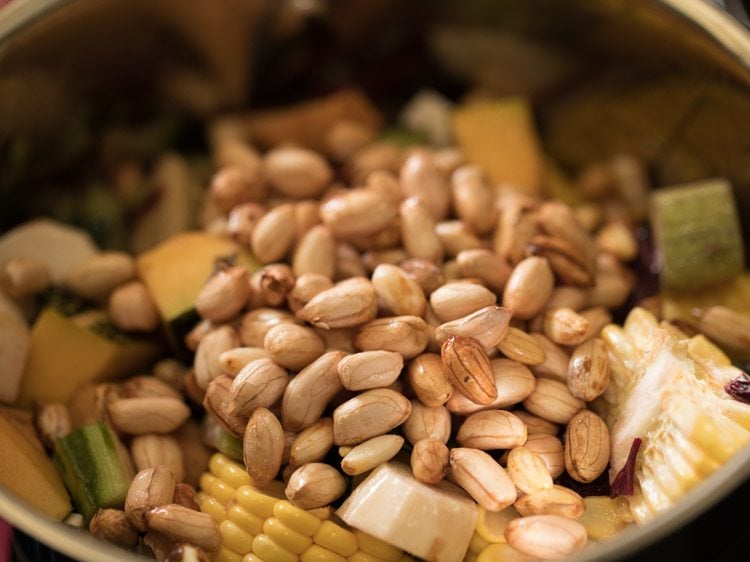
14. Add 2 cups water. For a semi dry or dry bhaji, you can add less water.
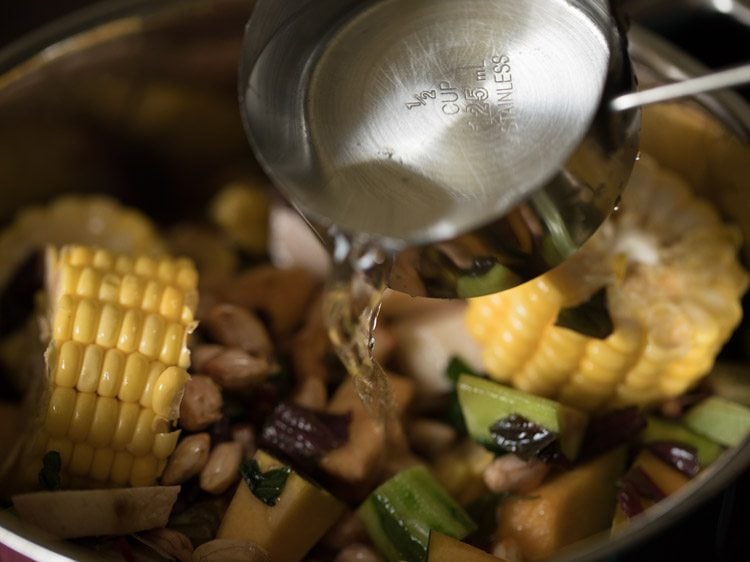
15. Season with salt as per taste.
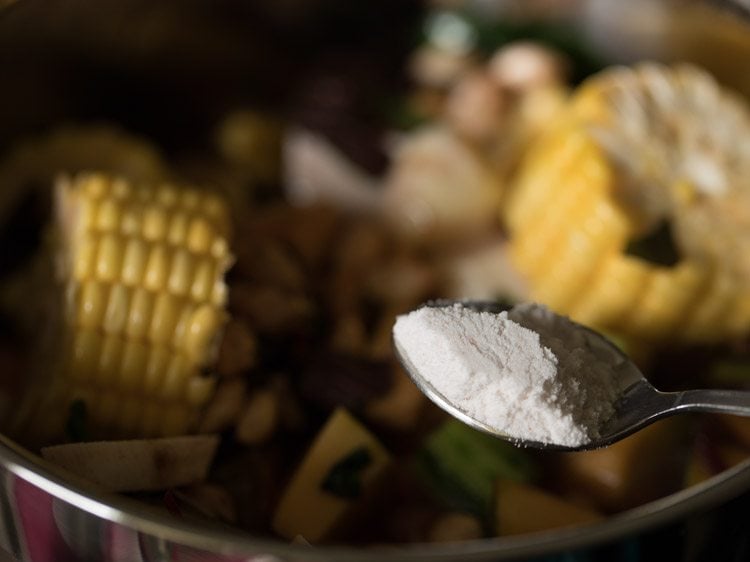
16. Mix very well.
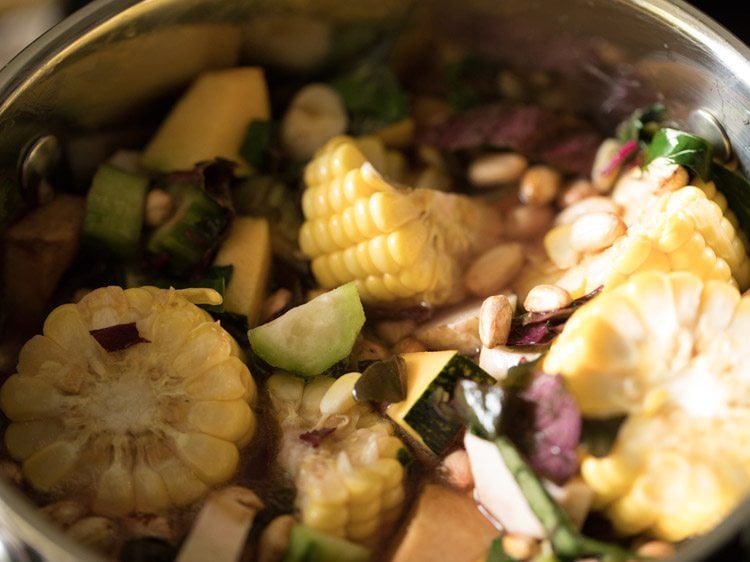
17. Cover and simmer the vegetables on low to medium heat.
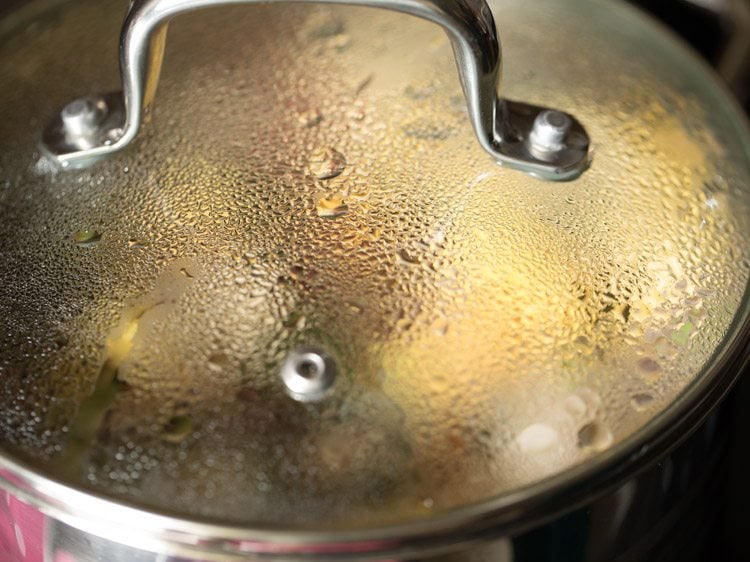
18. Check at intervals and give a stir.
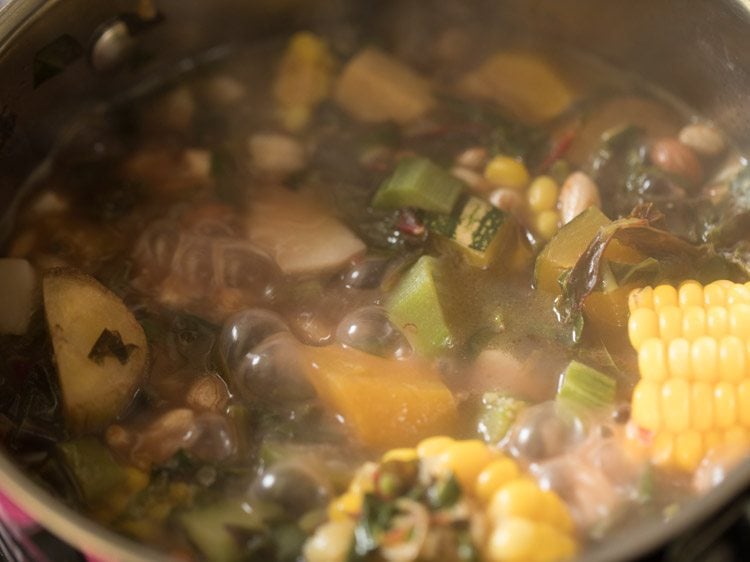
19. Simmer till the vegetables are cooked and tender. Cooking the vegetables takes about 25 to 30 minutes.
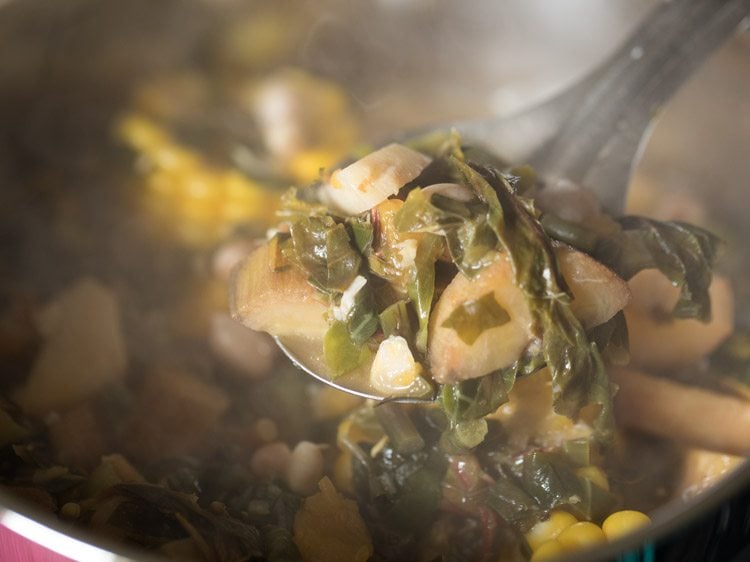
20. Then, add the tamarind pulp (which was made in steps 1 and 2).
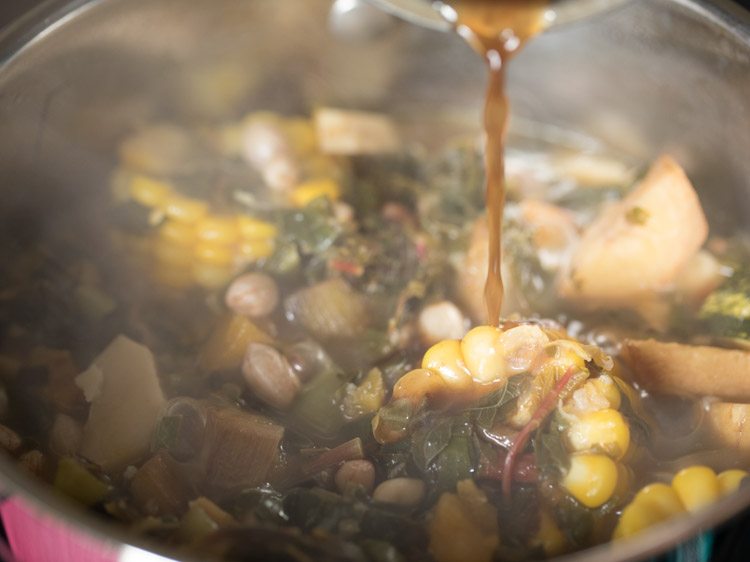
21. Add 1 cup finely grated fresh coconut. You can grind coconut a bit coarsely, if you want, and then add.
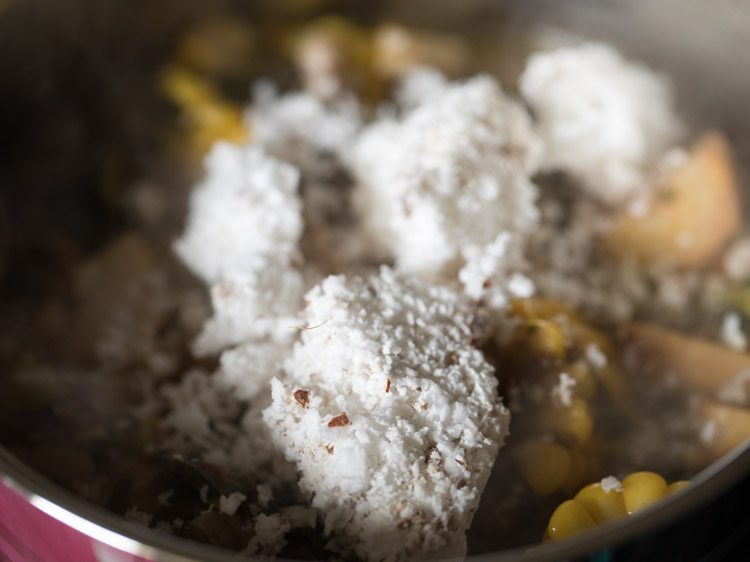
22. Mix very well.
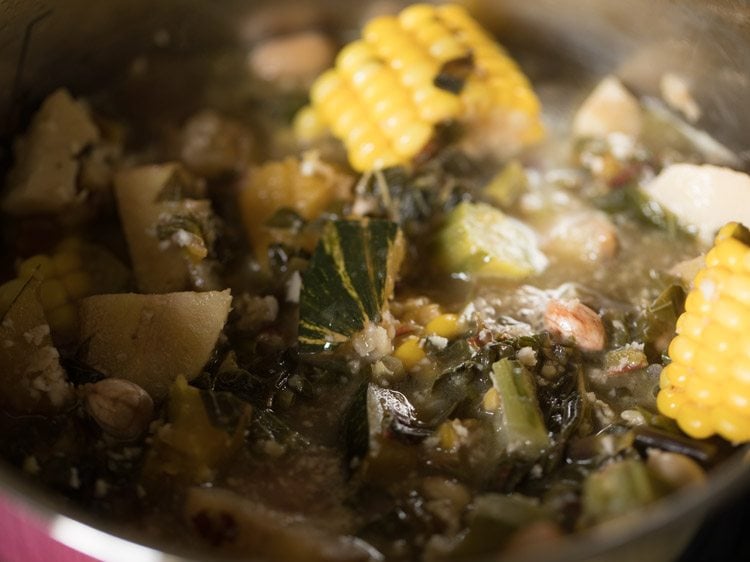
23. Cook Rishi Panchami Bhaji without a lid on low heat till the raw aroma of tamarind goes away. This takes about 6 to 7 minutes.
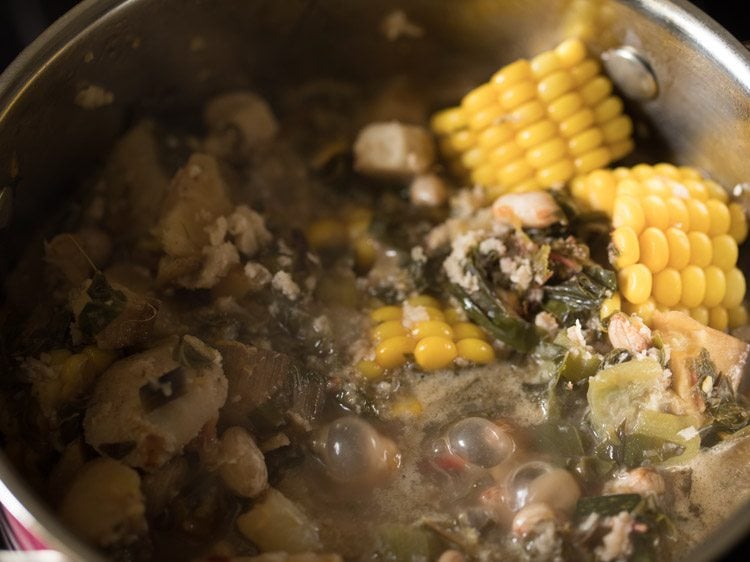
24. Lastly, add 1 tablespoon of jaggery powder or as required.
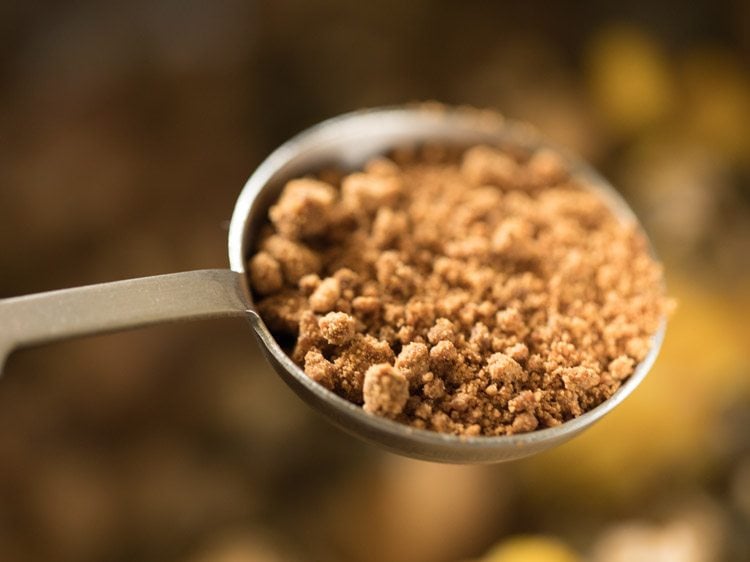
25. Mix very well and simmer Rushichi Bhaji for a minute.
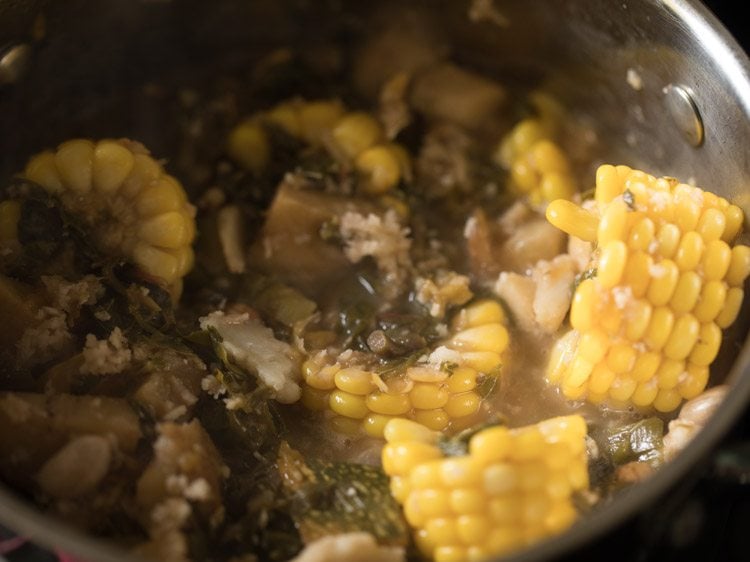
26. Serve Rushichi Bhaji hot or warm with rice bhakris (rice rotis) or rice pooris.
You can also have this bhaji with steamed rice or chapatis. The bhaji is so good that you can even have it plain.
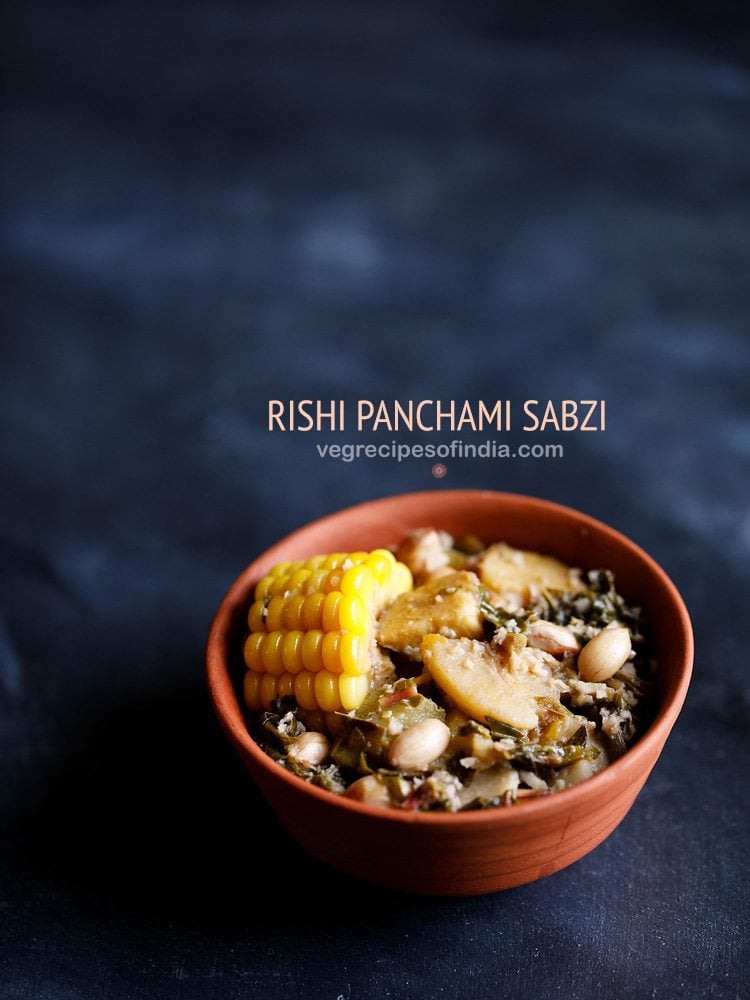
Expert Tips
- If you are not adding vegetables like yam and colocasia, that may cause irritation/itchiness in throat to some people, then you can skip adding the souring ingredient.
- When you are not adding any sour ingredients like curd or tamarind pulp in this recipe, then you can skip adding the jaggery too. This is only to balance the sourness.
- If you don’t have fresh peanuts, then you can use raw peanuts by soaking them in water overnight. Drain and use.
- You can chop the corn cob in roundels or even scrape off the kernels from the cob. Ensure chopping the veggies in medium sized cubes or squares.
- This recipe can also be cooked in ghee (clarified butter), instead of oil.
- If you want the bhaji to be dry or semi-dry, then add less water.
- The coconut can be freshly grated or ground coarsely, before adding in the recipe.
More Vegetable Recipes To Try!
Okra Recipes
Vegetable Recipes
Vegetable Recipes
Vegetable Recipes
Please be sure to rate the recipe in the recipe card or leave a comment below if you have made it. For more vegetarian inspirations, Sign Up for my emails or follow me on Instagram, Youtube, Facebook, Pinterest or Twitter.
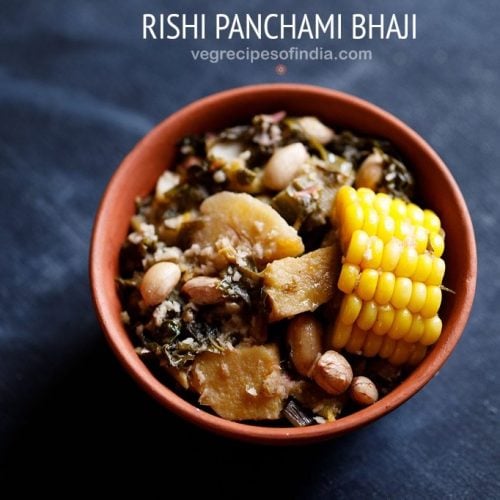
Rishi Panchami Bhaji | Rushichi Bhaji
Ingredients
Tamarind Pulp
- 1 teaspoon tamarind (imli)
- ¼ cup hot water
Veggies
- 700 grams mix vegetables – chopped
OR
- ¾ cup ridge gourd (turai, dodka), chopped
- ¾ cup yellow pumpkin (kaddu), chopped
- ½ cup elephant foot yam (suran), chopped
- ½ cup plantain – unripe banana (kachche kele), chopped
- ½ cup colocasia (arbi), chopped
- 1 cup colocasia leaves (arbi ke patte), chopped
- ¼ cup colocasia leaf stems (arbi ke danthal), chopped
- 1 cup red amaranth (chaulai), chopped
- ¼ cup amaranth stems (chaulai ke danthal), chopped
- 1 corn cob (makai), medium-sized
More Ingredients
- 3 tablespoons peanut oil – ghee also can be used
- 2 green chilies – chopped
- ½ cup fresh peanuts (moongphalli)
- 1 cup coconut – finely grated and fresh
- 1 tablespoon jaggery powder or add as required
- 2 cups water or as needed
- salt as required
Instructions
Preparation
- In a small bowl, take 1 teaspoon tamarind and ¼ cup hot water. Soak tamarind in hot water for 20 minutes.
- Later squeeze the pulp from the tamarind and keep aside.
- Meanwhile when the tamarind is soaking, rinse the leafy vegetables very well and keep aside. For the greens I have used colocasia leaves (arbi patta) and red amaranth leaves (chaulai).
- Also rinse and peel the other veggies. I have here used ridge gourd, yellow pumpkin, elephant foot yam, unripe banana and corn. I have used 700 grams of mix veggies including the greens.
- Shell fresh peanuts and rinse them too. You will need ½ cup fresh peanuts. If not using fresh peanuts, then soak ½ cup raw peanuts overnight in water. Drain the water and keep aside.
- Chop each veggie in squares or cubes. You can keep medium sized cubes. I have also chopped the steams of amaranth and colocasia leaves. You can chop the corn cob in roundels or you can even scrape of the corn kernels from the cob.
Making rushichi bhaji
- Heat 3 tablespoons peanut oil in a large pot or pan. Add 2 green chilies (chopped). You can also use ghee instead of oil.
- Sauté green chilies for some seconds.
- Next add the chopped amaranth and colocasia leaves along with the colocasia stems. Sauté for a minute.
- Then add the remaining chopped veggies and tubers.
- Mix very well and saute for 1 to 2 minutes.
- Add the ½ cup peanuts.
- Add 2 cups water.
- Season with salt as per taste. Mix very well.
- Cover and simmer the veggies on a low to medium heat.
- Check at intervals and give a stir.
- Simmer till the veggies are cooked and tender.
- Then add the tamarind pulp (which was made in step 1 and 2).
- Add 1 cup grated fresh coconut. You can grind coconut a bit coarsely if you want and then add. Mix very well.
- Cook rishi panchami bhaji without a lid on a low heat till the raw aroma of tamarind goes away. This takes about 6 to 7 minutes.
- Lastly add 1 tablespoon jaggery powder or add as required.
- Mix very well and simmer rishi panchami bhaji for a minute.
- Serve Rishi Panchami Bhaji hot or warm with rice bhakris (rice rotis) or rice pooris. You can also serve Rushichi Bhaji with steamed rice or chapati.
Notes
- In case you are not adding yam and colocasia, then you can skip adding the souring ingredients like tamarind pulp.
- If you are not adding any sour ingredients like curd or tamarind pulp in this recipe, then you can skip adding the jaggery too.
- If out of fresh peanuts, then you can use raw peanuts by soaking them in water overnight. Drain the water and use the peanuts.
- You can chop the corn cobs in roundels or even scrape off the kernels from the cob.
- Make sure to chop the veggies in medium-sized cubes or squares.
- You can use ghee instead of oil.
- If you want the bhaji to be dry or semi-dry, then add less water.
- The coconut can be freshly grated or ground coarsely, before adding in the recipe.
Nutrition Info (Approximate Values)
This Rushichi Bhaji recipe from the archives first published in August 2017 has been republished and updated on September 2023.
